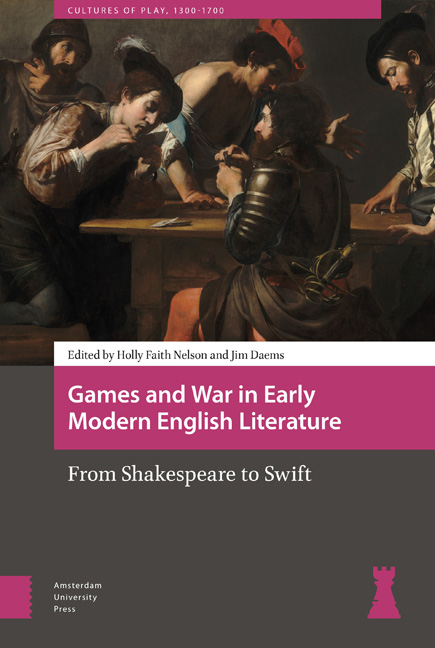Book contents
- Frontmatter
- Dedication
- Contents
- Acknowledgements
- The Interplay of Games and War in Early Modern English Literature: An Introduction
- 1 ‘Can this cock-pit hold the vasty fields of France?’ Cock-Fighting and the Representation of War in Shakespeare’s Henry V
- 2 Game Over: Play and War in Shakespeare’s Troilus and Cressida
- 3 Thomas Morton’s Maypole: Revels, War Games, and Transatlantic Conflict
- 4 Milton’s Epic Games: War and Recreation in Paradise Lost
- 5 Ciphers and Gaming for Pleasure and War
- 6 Virtual Reality, Role Play, and World-Building in Margaret Cavendish’s Literary War Games
- 7 Dice, Jesting, and the ‘Pleasing Delusion’ of Warlike Love in Aphra Behn’s The Luckey Chance
- 8 War and Games in Swift’s Battle of the Books and Gulliver’s Travels
- 9 Time-Servers, Turncoats, and the Hostile Reprint: Considering the Conflict of a Paper War
- Index
5 - Ciphers and Gaming for Pleasure and War
Published online by Cambridge University Press: 21 November 2020
- Frontmatter
- Dedication
- Contents
- Acknowledgements
- The Interplay of Games and War in Early Modern English Literature: An Introduction
- 1 ‘Can this cock-pit hold the vasty fields of France?’ Cock-Fighting and the Representation of War in Shakespeare’s Henry V
- 2 Game Over: Play and War in Shakespeare’s Troilus and Cressida
- 3 Thomas Morton’s Maypole: Revels, War Games, and Transatlantic Conflict
- 4 Milton’s Epic Games: War and Recreation in Paradise Lost
- 5 Ciphers and Gaming for Pleasure and War
- 6 Virtual Reality, Role Play, and World-Building in Margaret Cavendish’s Literary War Games
- 7 Dice, Jesting, and the ‘Pleasing Delusion’ of Warlike Love in Aphra Behn’s The Luckey Chance
- 8 War and Games in Swift’s Battle of the Books and Gulliver’s Travels
- 9 Time-Servers, Turncoats, and the Hostile Reprint: Considering the Conflict of a Paper War
- Index
Summary
Abstract
While ciphering was a critical communications necessity during the civil wars, and continued to play a vital role in secret political correspondence, the publication of cryptography manuals in the early modern period also made it a pleasurable pastime. The multiple editions of such books signal the genre's popularity. This chapter argues that cryptography has not been given its due in the cultural history of gaming. It demonstrates that cryptography, as a popular pastime, served as an intellectual, but more importantly, a patriotic game. This would contribute to further innovation in ciphering and deciphering applicable to the political world (during times of war and peace), therefore revealing the interplay between the serious world of politics and that of gaming.
Keywords: chess in England; early modern print culture; early modern pastimes in England; early modern how-to manuals
For Gustavus Selenus, as well as for later seventeenth-century political activists and Royal Society members John Wilkins, John Wallis, and Samuel Morland, cryptography was at once a communicational necessity during the Wars of the Three Kingdoms and their aftermath and a playful personal game of wits. Selenus, Wilkins, and Morland, along with Noah Bridges and John Falconer, authored instructional manuals to share their methods for creating unbreakable messages and deciphering complex, polyalphabetic, and even multimodal ciphers, and they were motivated by political and military advancement as well as individual academic curiosity and a love of mental challenge. Wallis's papers, edited by John Davys in 1737 as An Essay on the Art of Decyphering, characterize the genre's approach to cryptography with the term vaga Venatio (‘rambling hunt’): ‘[W]e sometimes start the Game, where we little expected to find it; but when that is once done, we are sufficiently recompenc’d by the Pleasure we take in the Pursuit.’ These print handbooks, which sold enough copies to warrant multiple editions, help everyday readers protect national and personal security as citizen-spies by promoting cryptography as an intellectually pleasurable game.
The importance of cryptography to military success may be intuitive for twentyfirst- century readers; since World War I and the publicized, well-documented roles of intelligence organizations like the Military Intelligence Division (MID), Bletchley Park, and organizations like the National Security Agency (NSA), ciphering and deciphering have become accepted necessities for national security. Countless histories report the ways in which modern wars have pivoted upon secret communication and the sophistication of a nation's military cryptography capabilities.
- Type
- Chapter
- Information
- Games and War in Early Modern English LiteratureFrom Shakespeare to Swift, pp. 95 - 116Publisher: Amsterdam University PressPrint publication year: 2019

